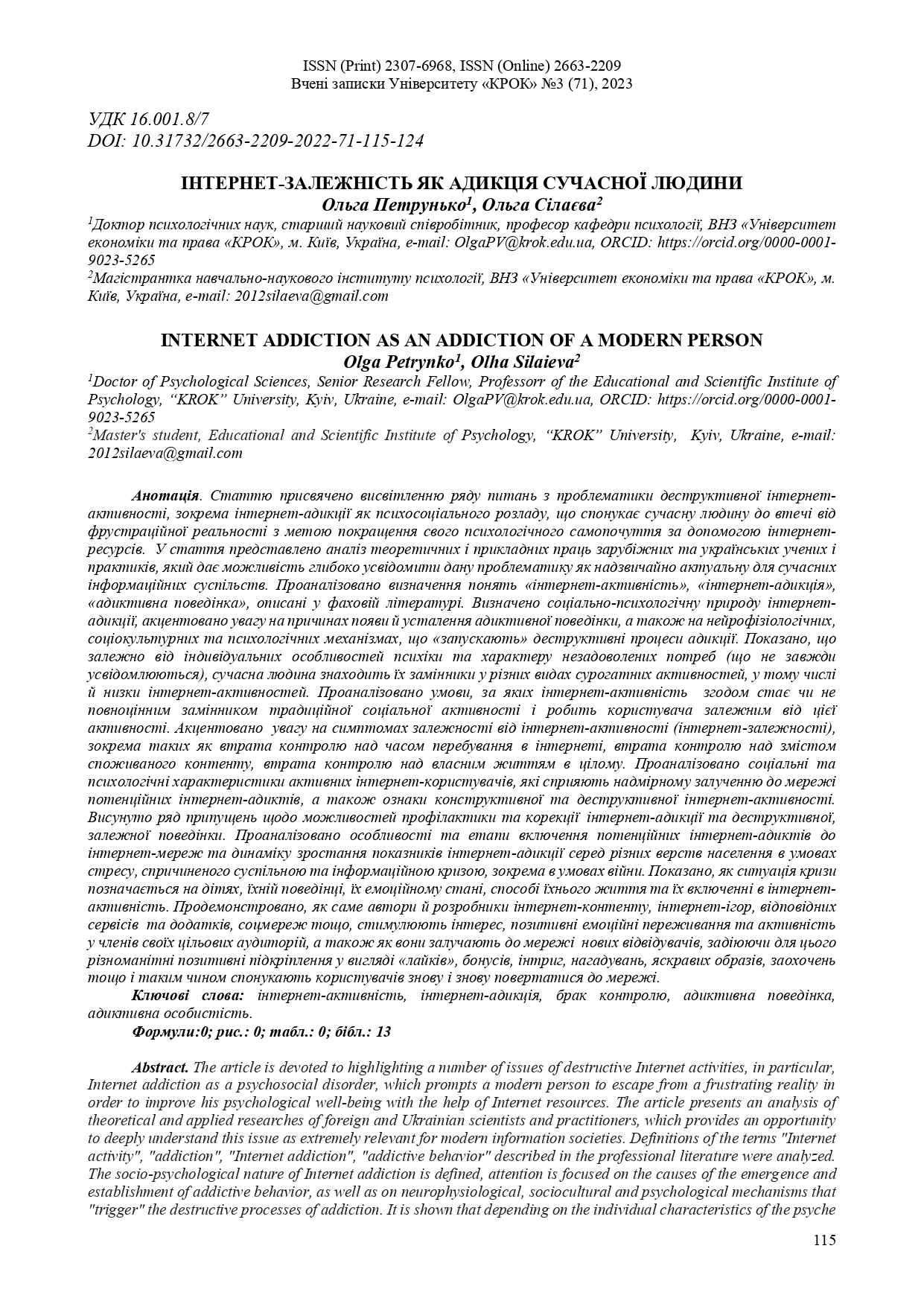INTERNET ADDICTION AS AN ADDICTION OF A MODERN PERSON
DOI:
https://doi.org/10.31732/2663-2209-2022-71-115-124Keywords:
Internet activities, Internet addiction, lack of control, addictive behavior, addictive personalityAbstract
The article is devoted to highlighting a number of issues of destructive Internet activities, in particular, Internet addiction as a psychosocial disorder, which prompts a modern person to escape from a frustrating reality in order to improve his psychological well-being with the help of Internet resources. The article presents an analysis of theoretical and applied researches of foreign and Ukrainian scientists and practitioners, which provides an opportunity to deeply understand this issue as extremely relevant for modern information societies. Definitions of the terms "Internet activity", "addiction", "Internet addiction", "addictive behavior" described in the professional literature were analyzed. The socio-psychological nature of Internet addiction is defined, attention is focused on the causes of the emergence and establishment of addictive behavior, as well as on neurophysiological, sociocultural and psychological mechanisms that "trigger" the destructive processes of addiction. It is shown that depending on the individual characteristics of the psyche and the nature of unsatisfied needs (which are not always realized), a modern person finds their substitutes in various types of surrogate activities, including Internet activities. The conditions under which Internet activity eventually becomes an almost full-fledged substitute for traditional social activity and even dependent on this activity are analyzed. Attention is focused on the symptoms of dependence on Internet activity (Internet addiction), in particular, such as loss of control over the time spent on the Internet, loss of control over the content of consumed content, loss of control over one's life in general. The social and psychological characteristics of active Internet users, which contribute to the excessive involvement of potential Internet addicts in the network, as well as signs of constructive and destructive Internet activity, are analyzed. A number of assumptions have been put forward regarding the possibilities of prevention and correction of Internet addiction and destructive, dependent behavior. The peculiarities and stages of inclusion (attraction) of potential Internet addicts to Internet networks and the dynamics of the growth of Internet addiction indicators among different segments of the population in conditions of stress caused by social and information crisis, in particular in conditions of war, are analyzed. It is shown how the crisis situation affects children, their behavior, their emotional state, their way of life and their involvement in Internet activities. It is demonstrated how the authors and developers of Internet content, Internet games, relevant services and applications, social networks, etc., stimulate interest, positive emotional experiences and activity among members of their target audiences, as well as how they attract new visitors to the network, acting for this various positive reinforcements in the form of "likes", bonuses, intrigues, reminders, bright images, incentives, etc. and thus encourage users to return to the network again and again.
Downloads
References
Kuss, D. J., Griffiths, M. D., & Binder, J. F. (2013). Internet addiction in students: Prevalence and risk factors. Computers in Human Behavior, 29(3), P. 959–966.
Griffiths, M. D., Kuss, D. J., Billieux, J., Pontes, H.M. (2016). The evolution of Internet addiction: A global perspective. Addictive Behaviors. № 53. P. 193–195.
Асєєва, Ю. О. Кіберадикція як проблема ХХІ століття: монографія. Одеса: ННВК «АТБ» , 2020. 414 с.
Петрунько, О.В. (2023). Аксіопсихологія та аксіогенез особистості в умовах соціальної кризи. Вчені записки Університету «КРОК». №1(69). С. 171–187.
Goldberg, А. Internet Addiction Disorder, 1995. http:// www.cog.brown.edu/brochure/people/duchon/humor/internet.addiction.html
Янг, К. (2008). Диагноз – Интернет-зависимость. СПБ: Мир Интернет, 2008. С. 24–29.
Петрунько, О.В. Діти і медіа: Соціалізація в агресивному медіасередовищі: Монографія. – Ніжин: Аспект-Поліграф, 2011. – 480 с.
Больбот, Т. Ю. Фактори ризику розвитку комп’ютерної залежності в осіб молодого віку. Український вісник психоневрології. Київ, 2004. Т. 12. № 4(41). с. 75-80.
Лембке, А. Дофамінове покоління. Де межа між болем і задоволенням. К.: Лабораторія, 2022. 217 с.
Петрунько, О.В, Паціора, Г.М. (2023). Особливості віктимної поведінки молоді. Вчені записки Університету «КРОК». №2(70). С. 159–165.
Найдьонова, Л.А. (2007). Рефлексія віртуальності – новий підхід до формування медіа-та-інформаційної грамотності (МІГ) / Тези доповідей Міжнародної науково-практичної Інтернет-конференції «Віртуальний освітній простір: психологічні проблеми». Режим доступу: http://www.psy-science.com.ua/Konferenciya_2012_05_28.htm
Лучинкіна, А.І. Психологія інтернет-соціалізації особистості. Сімферополь: ВД «Аріал», 2013. 356 с.
Synhaivska, I., Gulko, G. (2021). The Impact of the Pandemic on the Level of Students Anxiety. Proceedings of the International Conference on Economics, Law and Education Research. K.: Atlantis press. P. 75–79.

Downloads
Published
How to Cite
Issue
Section
License

This work is licensed under a Creative Commons Attribution-NonCommercial 4.0 International License.

